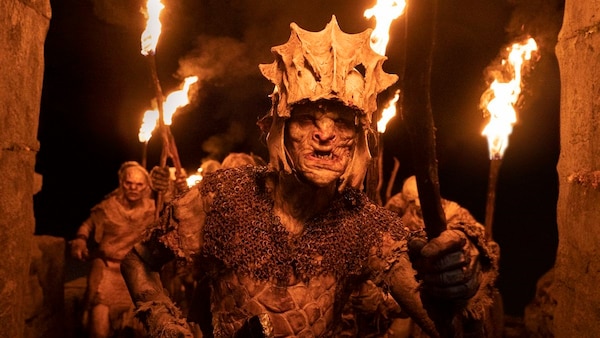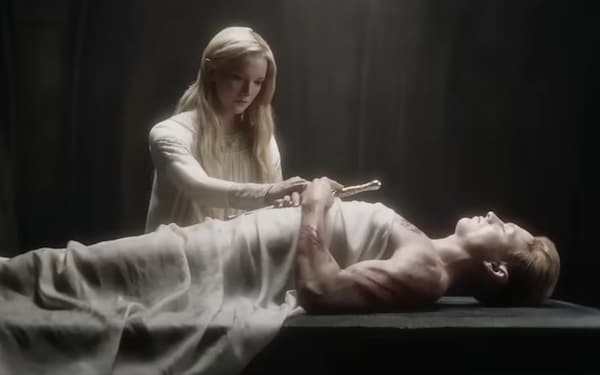The Lord Of The Rings: The Rings Of Power Is An Empty Spectacle

- Gayle Sequeira
Film Companion
Last Updated: 10.12 AM, Sep 02, 2022

Directors: Wayne Yip, J.A. Bayona, Charlotte Brändström
Writers: Patrick McKay, John D. Payne, Jason Cahill, Justin Doble, Gennifer Hutchison
Cast: Morfydd Clark, Robert Aramayo, Nazanin Boniadi, Benjamin Walker, Cynthia Addai-Robinson
Even to the most optimistic, the idea of a Lord of the Rings prequel show is likely to give off faint ‘taking-the-ring-to-Mordor’ doomed-mission vibes. It was never going to be easy to carve out an entire series from the appendices of books written nearly a century ago, much less meet the standard of a movie trilogy that now feels timeless. Even accounting for these disadvantages, it’s sad to discover just how disappointing The Lord of the Rings: The Rings of Power is for a show about hope, how dull it is for a series slotted as fantasy.
Its forges — set up by the multi-billion dollar Amazon corporation it’s produced by — occasionally churn out images of great beauty, but far less durability. Few, if any, stick with you after the credits roll. When there is so much emphasis on the aesthetic, the effect is that of artifice instead. One brief shot meant to convey the horrors of war fails because the visual impression is that of bodies artfully arranged across the field, rather than of soldiers brutally cut down in the thick of battle. When each scene is sealed under a layer of lacquer and gloss, how can any emotion hope to pierce through?
Much like The Fellowship of the Ring (2001), this show too begins with a voiceover from Galadriel (Morfydd Clark). Where she once spoke of hope being lost, now she speaks of its blossoming, of a time when the Earth was too young to birth true evil. But then the voiceover goes on and on, soundtracking Rings of Power’s rush through ages of backstory — when a prequel to a franchise frantically needs to get its own pre-prequel segment out of the way first, the result can’t help but be jarring. Morgoth’s ascent and fall is dispensed with in minutes as the rise of his servant Sauron emerges as the thread the show is more interested in following.
As signs of his presence appear across Middle Earth, the writers begin reducing characters to catalysts. Their behaviour exists to serve a single moment but lacks sense within the context of the series. A single mother jumps at the chance to join the man she harbours a secret affection for when he sets out to investigate mysterious occurrences, but in doing so, she abandons her young son without a second thought. In another scene, a warrior jumps off a ship in defiance of her tribe to keep a promise she made to her dead brother. It’s a big moment of bravado, but one that’s diluted by repeated cutaways to her swimming across the unending sea, her lack of foresight unable to compensate for her conviction. Lines like, “Evil does not sleep” are sprinkled across the series, for anyone who was under the impression that it does.
It doesn’t help that the several locations in The Rings of Power, such as the Elven and Dwarven dwellings give off a distinctly fake, CGI sheen. Cameras repeatedly pan up to showcase flat, unimposing structures. When Galadriel, out on a quest, speaks of a yearning to return home, her words remain words without meaning because the ‘home’ was never established in the first place. There’s an overreliance on maps, which even then can’t seem to convey where the show’s array of locations are in relation to each other, even as it hopscotches across them. The single most impressive use of space comes in the latter of the two episodes screened so far, in which the elven soldier Arrondir (Ismael Cruz Córdova) squeezes himself through a particularly cramped stretch of underground tunnel while fleeing from an unseen enemy.
By contrast, one of the triumphs of Peter Jackson’s superlative Lord of the Rings trilogy was its keen sense of place, and the way it was used to establish the characters’ roots and gird their sense of purpose. Frodo Baggins (Elijah Wood) and Samwise Gamgee (Sean Astin) might have set out on an epic adventure, but in a subversion of modern fantasy, it was one marked by the constant yearning to return home instead. The idyllic pastoral life of the Shire, with its emphasis on rest and relaxation, made it understandable why. Each time the characters set out over the sprawling vistas of New Zealand, over which the camera lovingly glided, it was a reminder of the home they’d lose if they failed in their mission. The darkened skies of Mordor, and its artificial landscape, triggered an immediate revulsion.
In Rings of Power, even a giant sea creature dubbed ‘the worm’ can’t inspire the same dread that The Return of the King did with Shelob the giant spider, inventively combining camera angles and practical effects for maximum nightmare fuel. In fleeting moments, the episodes do spark moments of warmth and intimacy — between Elrond (Robert Aramayo) and his friend, the dwarven prince Durin (Owain Arthur), between healer Bronwyn (Nazanin Boniadi) and Arrondir, shot in close-ups — but too much feels like set-up with little urgency or stakes.
At various points, the characters yearn for more — to be more, to see more, to want more out of a relationship they can’t afford to let themselves be drawn into. It’s disheartening that Rings of Power, with a vacuum where its heart should be, feels less.

 Premium
Premium